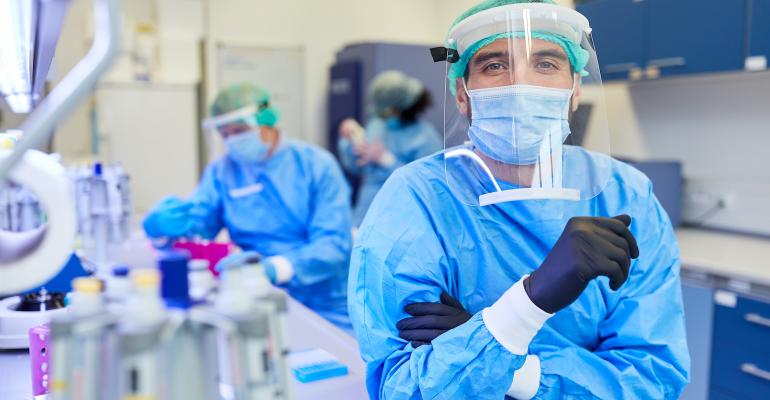One of the most important factors to successfully navigate through uncertainty is to be prepared, said Dr Patrick Godbey, founder and laboratory director at Southeastern Pathology Associates. Speaking remotely from Brunswick, Georgia, Dr Godbey explained how benchmarking best practices helps keep labs in check, even at times of uncertainty.
“Pandemic preparedness comes from having the knowledge and support from worldwide experts. Accredited labs receive clear guidance on the verification and validation of their practices. The most significant changes you’ll see is in quality management and infection control,” he said.
Dr Godbey is also president of the College of American Pathology (CAP), which explains his advocacy for accreditation and standardisation, particularly for Covid-19 testing. “The foundation of good healthcare is a high quality laboratory. A quality lab that can provide diagnostic confidence comes from preparedness and proficiency testing and external quality assessment (EQA),” he explained. “And not just any accreditation, one built with the expertise of practicing pathologists using a model of guidance of what to do and how to do it,” he added.
EQA or proficiency testing provides benchmarking opportunities based on volume of testing, supply and more. It is important to be able to monitor and compare results and standards across multiple instruments or locations.
For in-person event panellist, Dr Ismail Bakhsh, Consultant Clinical Scientist at National Medical Care Co in Riyadh, a main challenge for laboratories today is that “change sometimes needs to be forced”.
“Laboratories may resist changes to standardisation, consolidation and centralisation, which are all required to maintain excellence,” he explained. “The challenge is also cultural. Having support from the leadership is the key component here. Leadership teams need to advocate for the clients, which are the patients, while also providing a smooth experience for physicians. The lab staff only comes into this cycle towards the end. Change needs to start from the top.”
Ultimately, laboratories are like many other businesses and have been affected by the pandemic to varying degrees depending on their location, patient care levels and most importantly, their own work culture. “As with many other organisations, labs of all sizes and specialisations have been impacted by the current coronavirus pandemic,” said another panellist Shirley Luciap, Laboratory and Quality Manager at King's College Hospital London in Dubai.
Many teams face communication blocks which makes acknowledging errors and maintaining excellence near impossible. “Being in the lab field for the last 20 years, I can connect with the experiences and responses of laboratory staff, and communication is a key area that needs to be improved.”
Other topics covered in Medlab on Monday included Changes and advances in the field of pathology, and Current and future Point-of-Care Tests for emerging viruses and future perspectives.
One of the most important factors to successfully navigate through uncertainty is to be prepared, said Dr Patrick Godbey, founder and laboratory director at Southeastern Pathology Associates. Speaking remotely from Brunswick, Georgia, Dr Godbey explained how benchmarking best practices helps keep labs in check, even at times of uncertainty.
“Pandemic preparedness comes from having the knowledge and support from worldwide experts. Accredited labs receive clear guidance on the verification and validation of their practices. The most significant changes you’ll see is in quality management and infection control,” he said.
Dr Godbey is also president of the College of American Pathology (CAP), which explains his advocacy for accreditation and standardisation, particularly for Covid-19 testing. “The foundation of good healthcare is a high quality laboratory. A quality lab that can provide diagnostic confidence comes from preparedness and proficiency testing and external quality assessment (EQA),” he explained. “And not just any accreditation, one built with the expertise of practicing pathologists using a model of guidance of what to do and how to do it,” he added.
EQA or proficiency testing provides benchmarking opportunities based on volume of testing, supply and more. It is important to be able to monitor and compare results and standards across multiple instruments or locations.
For in-person event panellist Dr Ismail Bakhsh, Consultant Clinical Scientist at National Medical Care Co in Riyadh, a main challenge for laboratories today is that “change sometimes needs to be forced”.
“Laboratories may resist changes to standardisation, consolidation and centralisation, which are all required to maintain excellence,” he explained. “The challenge is also cultural. Having support from the leadership is the key component here. Leadership teams need to advocate for the clients, which are the patients, while also providing a smooth experience for physicians. The lab staff only comes into this cycle towards the end. Change needs to start from the top.”
Ultimately, laboratories are like many other businesses and have been affected by the pandemic to varying degrees depending on their location, patient care levels and most importantly, their own work culture. “As with many other organisations, labs of all sizes and specialisations have been impacted by the current coronavirus pandemic,” said another panellist Shirley Luciap, Laboratory and Quality Manager at King's College Hospital London in Dubai. Many teams face communication blocks which makes acknowledging errors and maintaining excellence near impossible. “Being in the lab field for the last 20 years, I can connect with the experiences and responses of laboratory staff, and communication is a key area that needs to be improved.”
Other topics covered in MedLab on Monday included Changes and advances in the field of pathology, and Current and future Point-of-Care Tests for emerging viruses and future perspectives.


